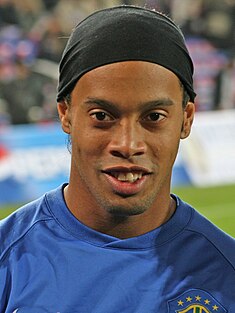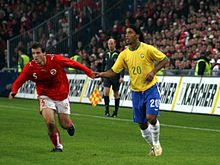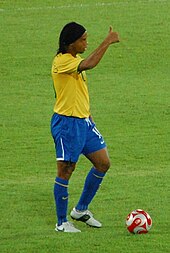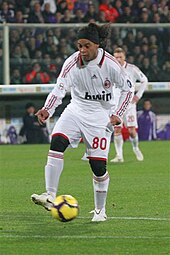 Ronaldinho with Brazil | |||
| Personal information | |||
|---|---|---|---|
| Full name | Ronaldo de Assis Moreira | ||
| Date of birth | 21 March 1980 | ||
| Place of birth | Porto Alegre, Brazil | ||
| Height | 1.81 m (5 ft 11 1⁄2 in)[1] | ||
| Playing position | Attacking midfielder / Forward | ||
| Club information | |||
| Current club | Flamengo | ||
| Number | 10 | ||
| Youth career | |||
| 1987–1998 | Grêmio | ||
| Senior career* | |||
| Years | Team | Apps† | (Gls)† |
| 1998–2001 | Grêmio | 52 | (21) |
| 2001–2003 | Paris Saint-Germain | 55 | (17) |
| 2003–2008 | Barcelona | 145 | (70) |
| 2008–2011 | Milan | 76 | (20) |
| 2011– | Flamengo | 31 | (14) |
| National team‡ | |||
| 1996 | Brazil U17 | 6 | (2) |
| 1999 | Brazil U20 | 5 | (3) |
| 2000–2008 | Brazil U23 | 10 | (3) |
| 1999– | Brazil | 93 | (33) |
Ronaldo de Assis Moreira (born 21 March 1980 in Porto Alegre), commonly known as Ronaldinho (Portuguese pronunciation: [ʁonawˈdʒĩɲu]) or Ronaldinho Gaúcho,[2] is a Brazilian footballer who plays for Flamengo and the Brazilian national team as an attacking midfielder or forward. He is a two-time winner of the FIFA World Player of the Year, awarded to the best player over the year. He won the award in both 2004 and 2005.
"Ronaldinho," the diminutive and term of endearment for "Ronaldo," is accompanied in Brazilian usage by the nickname "Gaúcho," in order to distinguish him from fellow footballer and countryman Ronaldo, who was known as "Ronaldinho" in Brazil beforehand. Ronaldo simply went by his first name upon his move to Europe, thereby allowing Ronaldinho to drop the "Gaúcho" and go by the name Ronaldinho abroad.
Prior to his move to Flamengo, he played for Paris Saint-Germain F.C., FC Barcelona and A.C. Milan. With the Spanish club, he won his first Champions League in 2006 and the Ballon d'Or in 2005. He became a Spanish citizen in January 2007.[3]
He was also named in the FIFA 100, a list of the greatest footballers compiled by fellow countryman Pelé, and in the FIFPro World XI consecutively from 2004–2007.
Biography
Ronaldinho was born in the city of Porto Alegre, the state capital of Rio Grande do Sul. His mother, Dona Miguelina Elói Assis dos Santos (daughter of Enviro Assis),[4] is a former salesperson who studied to become a nurse. His father, João de Assis Moreira, was a shipyard worker and footballer for local club Esporte Clube Cruzeiro (not to be confused with Cruzeiro).[5] He suffered a fatal heart attack in the family swimming pool when Ronaldinho was eight. After Ronaldinho's older brother, Roberto, signed with Grêmio, the family moved to a home in the more affluent Guarujá section of Porto Alegre, which was a gift from Grêmio to convince Roberto to stay at the club. Roberto's career was ultimately cut short by injury.Ronaldinho's football skills began to blossom at the of age 8, and he was first given the nickname Ronaldinho because he was often the youngest and the smallest player in youth club matches.[6] He developed an interest in futsal and beach football, which later expanded to organized football. His first brush with the media came at the age of thirteen, when he scored all 23 goals in a 23–0 victory against a local team.[7] Ronaldinho was identified as a rising star at the 1997 U-17 World Championship in Egypt, in which he scored two goals on penalty kicks.[8][9]
Today, Roberto acts as Ronaldinho's manager, while his sister Deisi works as his press coordinator.[6][10] Ronaldinho became a father for the first time on 25 February 2005, after Brazilian dancer Janaína Mendes gave birth to their son, who was named João after Ronaldinho's late father.[11]
Ronaldinho's 2005 Nike advertisement, where he is given a new pair of boots and then proceeds to juggle a football and repeatedly volley it against the crossbar of a goal and recover it without the ball touching the ground, went viral on YouTube, becoming the site's first video to reach one million views.[12]
Club career
Grêmio
Ronaldinho's career began with the Grêmio youth squad. He made his senior side debut during the 1998 Copa Libertadores.[13] In 2001, Arsenal expressed interest in signing Ronaldinho, but the move collapsed after he could not obtain a work permit because he was a non-EU player who had not played enough international matches.[14] He considered playing on loan with Scottish Premier League side St. Mirren, which never happened due to his involvement in a fake passport scandal in Brazil.[15]Paris Saint-Germain
In 2001, Ronaldinho signed a five-year contract with French side Paris Saint-Germain in a EUR5 million transfer.[16] Upon his arrival in Paris, Ronaldinho was given the number 21 shirt and inserted into a lineup that included fellow Brazilian Aloísio and midfielders Mikel Arteta and Jay-Jay Okocha. Ronaldinho made his league debut for the club on 4 August 2001 appearing as a substitute in a 1–1 draw with Auxerre.[17] Ronaldinho spent the majority of the 2001 portion of the season alternated between the bench and starter's role. He scored his first goal for the club on 13 October in a 2–2 draw against Lyon converting the equalizing penalty in the 79th minute after having come on 10 minutes prior.[18] After returning from the winter break, Ronaldinho went on a tear scoring a goal in four consecutive matches to open the new campaign. He recorded impressive goals against Monaco, Rennes, Lens and Lorient. On 16 March 2002, Ronaldinho recorded a double in PSG's 3–1 victory against relegation strugglers Troyes. He scored his final league goal of the season in the club's 2–0 win over Metz on 27 April.Ronaldinho was also influential in the 2001–02 edition of the Coupe de la Ligue helping Paris Saint-Germain reach the semi-finals where they were eliminated by Bordeaux. In a Round of 16 match against Guingamp, Ronaldinho scored two second half goals in the game after having entered the match as a half-time substitute. Despite Ronaldinho's initial success with the club, the season was marred by controversy with Paris Saint-Germain manager Luis Fernández claiming that the Brazilian was too focused on the Parisian nightlife rather than football, and complained that his holidays in Brazil never ended at the scheduled times.[13]
Despite repeated rifts with Fernández, Ronaldinho returned to the team for the 2002–03 season with the player switching to the number 10 shirt. Though his performances in his sophomore season with the club were underwhelming compared to his first, Ronaldinho performed admirably with the club. On 26 October 2002, he scored two goals in Paris Saint-Germain's 3–1 victory over Classique rivals Marseille. The first goal was a free kick, which curled past numerous Marseille players in the 18-yard box before sailing past goalkeeper Vedran Runje. In the return match, he again scored in Paris Saint-Germain's 3–0 victory at the Stade Vélodrome. Ronaldinho was also praised for his performance in the Coupe de France when he scored both goals in the club's 2–0 win over Bordeaux in the semi-finals, which inserted Paris Saint-Germain into the final. After scoring his first goal in the 22nd minute, Ronaldinho capped the game in the 81st minute accurately chipping the ball at the 18-yard box over the head of goalkeeper Ulrich Ramé, despite Ramé being in a favorable position. For his performance, Ronaldinho was given a standing ovation by the Parisian supporters. Unfortunately for the club, Ronaldinho and the team failed to capture the form that got them to the final as the bowed out 2–1 to Auxerre due to a last minute goal from Jean-Alain Boumsong. Despite Ronaldinho's performances, the club finished in disappointing 11th place position. Following the season, Ronaldinho declared he wanted to leave the club after the capital club failed to qualify for any European competition.
Barcelona
Originally, FC Barcelona president Joan Laporta had promised to bring David Beckham to the club, but following his transfer to Real Madrid, Barcelona entered the running for Ronaldinho and outbid Manchester United for his signature in a reported EUR30 million.[19][20] He made his team debut in a friendly against Milan at Robert F. Kennedy Memorial Stadium in Washington, D.C., scoring one goal in a 2–0 victory. After suffering from injury during the first half of the campaign,[21] he returned and helped lead Barcelona to a second-place league finish.Ronaldinho won his first league title in 2004–05, and was named FIFA World Player of the Year on 20 December 2004. In 2005, Ronaldinho received his second consecutive honour of FIFA World Player of the Year, beating Chelsea's Frank Lampard and fellow Barça player Samuel Eto'o. On 8 March 2005, Barcelona were eliminated from the UEFA Champions League by Chelsea in the first knockout round, with Ronaldinho scoring both goals in a 4–2 loss.[22]
With his contract expiring in 2008, Ronaldinho was offered an extension until 2014 that would have net him £85 million over nine years,[23] but he turned it down. In September 2005, he signed a two-year extension that contained a minimum-fee release clause that allowed him to leave should a club make an offer to Barcelona of at least £85 million for him.[24]

Ronaldinho taking a corner against Celta Vigo in 2005
Ronaldinho was chosen for the UEFA Team of the Year for the third consecutive time in January 2006, and he contributed one goal in Barcelona's elimination of Benfica in the 2005–06 Champions League quarterfinals with a 2–0 home victory. After a 1–0 semifinal aggregate win over Milan, in which Ronaldinho assisted the series' only goal by Ludovic Giuly, Barcelona progressed to the Champions League final, which they won on 17 May 2006 with a 2–1 defeat of Arsenal. Two weeks earlier, Barcelona had clinched their second straight La Liga title with a 1–0 win over Celta Vigo, giving Ronaldinho his first career double. He finished the season with a career-best 26 goals in all competitions, and was named the 2005–06 Champions League Player of the Year.
On 25 November 2006, Ronaldinho scored his 50th career league goal against Villarreal, then later scored a second time with an overhead bicycle kick. He later said to reporters that the latter was a goal he had dreamed of scoring since he was a boy.[25] He scored once and set up two others in Barcelona's 4–0 Club World Cup win over Mexico's Club América on 14 December, but Barcelona were defeated 1–0 by Brazilian club Internacional in the final.[26] Ronaldinho was nonetheless the recipient of the Bronze Ball Award for the competition.
The next day, Ronaldinho finished third in the 2006 FIFA World Player of the Year, behind World Cup-winning captain Fabio Cannavaro and Zinedine Zidane.[27] Ronaldinho was named among the UEFA Team of the Year for the third straight time in January 2007, receiving the highest number of votes with over 290,000 nominations.[28] He was forced to miss a charity match on 13 March due to an injury he had picked up several days earlier in Barcelona's 3–3 El Clásico draw with Real Madrid.[29][30]
He played his 200th career match for Barcelona in a league match against Osasuna on 3 February 2008. However, his 2007–08 campaign as a whole was plagued by injuries, and a muscle tear in his right leg on 3 April prematurely ended his season.[31] On 19 May, Laporta stated that Ronaldinho needed a "new challenge," claiming that he needed a new club if he were to revive his career.[32] Manchester City owner Thaksin Shinawatra confirmed on 6 June that he was interested in acquiring him.[33]
Ronaldinho and Barcelona teammate Lionel Messi each captained a team of international stars in an anti-racism exhibition match in Venezuela on 28 June, which ended in a 7–7 draw. Ronaldinho finished with a pair of goals and two assists in what would be his last match as a Barcelona player.[34] In preparation for the 2010 Joan Gamper Trophy, Ronaldinho sent an open letter to the fans and players of Barcelona, stating that his best years had been the five he spent in the Catalan club.[35]
Milan
In July 2008, Ronaldinho turned down a £25.5 million offer from Manchester City[36] to join Italian Serie A giants Milan on a three-year contract thought to be worth around £5.1 million (EUR6.5 million) a year, for €22.05M plus €1.05M bonus each season (€24.15M in 2010).[37][38][39] With the number 10 already occupied by teammate Clarence Seedorf, he selected 80 as his jersey number.Ronaldinho scored his first goal for Milan in a 1–0 derby victory over rival Internazionale on 28 September 2008. His first brace was in a 3–0 win over Sampdoria on 19 October 2008. He scored a 93rd-minute match-winner against Braga in the UEFA Cup group stage on 6 November.
He finished his first season at Milan with 10 goals from 32 appearances in all competitions. After a good start to the season, Ronaldinho struggled with fitness, and was often played from the bench to end a disappointing first season for Milan.
His second season did not begin on a high note, although he started nearly every match before finding himself on the bench again. After a while, Ronaldinho rediscovered his form and has been arguably Milan's best player in the season. He has changed his role from an attacking midfielder to a left winger, a more familiar role.
On 10 January 2010, Ronaldinho scored two goals against Juventus in an away match, sealing a 3–0 victory for the Rossoneri. In the following match against Siena on 17 January 2010, Ronaldinho scored his first hat-trick for Milan when he converted a spot kick, scored with a header from a corner and finished with a wonder goal from 20 yards out.[40]
On 16 February, Ronaldinho played his first match against Manchester United in a Champions League game. He scored early in the game to give Milan the lead. Milan ended up losing the game 3–2, with a goal from Paul Scholes and two goals from Wayne Rooney.
As of 13 April 2010, Ronaldinho was the assist leader of Serie A with a total of 14 assists.[41] On a less positive note, Ronaldinho missed three penalties in the 2009–10 season, to add to one botched kick the previous season. Ronaldinho ended the season scoring two goals against Juventus, Luca Antonini opened the scoring and Milan went on to win 3–0. It was Leonardo's last game in charge.

Ronaldinho against Real Madrid
Flamengo
After being heavily linked with a move back to his childhood club Grêmio, Ronaldinho joined Flamengo on 11 January 2011 with a contract ending in 2014.[42] During the transfer saga, many reports had linked the former World Player of the Year to joining different clubs such as Los Angeles Galaxy, Corinthians, Palmeiras and English FA Premier League side Blackburn Rovers. He was greeted by more than 20,000 fans at his unveiling at his new club on 13 January 2011.[43] He scored his first goal for Flamengo in the 3–2 victory against Boavista on 6 February 2011.[44] On 27 February Ronaldinho converted a second-half free kick for Flamengo to beat Boavista 1–0 and win his first piece of silverware with the team, the Taça Guanabara. Ronaldinho lifted his first trophy with Flamengo after curling in a right-footed shot over the wall in the 71st minute at Engenhão stadium. The goal gave Flamengo its 19th Taça Guanabara title, which earned the Campeonato Carioca title two months later, as the team also won the Taça Rio. On 27 July 2011, Ronaldinho scored a hat-trick in Flamengo's 4-5 away win against rivals Santos, after being 3-0 down inside the first 30 minutes.[45]International career

Ronaldinho takes a corner kick during the 2006 World Cup

Ronaldinho with Brazilian President Lula
In 2000, Ronaldinho participated in Summer Olympics in Sydney, Australia with Brazil U-23 team. Earlier that year, Ronaldinho led Brazil to win the Pre-Olympic Tournament, scoring nine goals in seven matches. However in the Olympics, Brazil was eliminated in the quarterfinal by Cameroon, who later won the gold medal. Ronaldinho appeared four times and scored only one goal, which came in the quarterfinal defeat by Cameroon.
Ronaldinho participated in his first World Cup in 2002, as part of a formidable offensive unit with Ronaldo and Rivaldo, who were also on the 1999 Copa América winning squad. He appeared in five matches and scored two goals, as well as contributing several important assists. His first goal came in the group stage match against China, which Brazil won 4–0. The second goal was a match-winning goal in the quarterfinal against England on 21 June. In the 50th minute, Ronaldinho took a free-kick from 35 metres, beating England goalkeeper David Seaman to give Brazil a 2–1 lead. However, seven minutes later, he was sent-off for a foul on England defender Danny Mills. He was suspended for the semifinal, but returned to Brazil's starting lineup for the 2–0 victory over Germany in the final as Brazil won the World Cup for the fifth time.

Ronaldinho against Switzerland's Xavier Margairaz
He was the capitain of Brazil to its second Confederations Cup title in 2005, and was named Man of the Match in a 4–1 victory over archrivals Argentina in the final on 29 June. Ronaldinho scored three goals in the tournament and is tied with Cuauhtémoc Blanco as the tournament's all-time scorer with nine goals.

Ronaldinho at the 2008 Summer Olympics.
On 24 March 2007, he scored twice in a 4–0 win over Chile, which marked his first goal since the 2005 Confederations Cup final and thus ended a scoreless streak that lasted nearly two years.[50] He was not called up for the 2007 Copa América after asking to be excused from the tournament due to tiredness.[51] On 18 October, he was controversially benched by Barcelona after he was late returning to Spain following Brazil's 5–0 friendly win over Ecuador. He and several Brazil players celebrated the win by partying through the night at a posh Rio de Janeiro nightclub. Ronaldinho left at 11 am the next morning, allegedly in the trunk of a car in order to avoid the media.[52]
On 7 July 2008, Ronaldinho was named to Brazil's 2008 Summer Olympics squad as one of the over-age players.[53] Barcelona initially blocked the move because of his then-upcoming Champions League commitments with the club, but the decision was later nullified following Ronaldinho's transfer to Milan, who in turn permitted him to make the trip to Beijing.[54] Ronaldinho scored his only two goals in a 5–0 victory over New Zealand before Brazil were beaten by Argentina in the semifinal. Brazil finished with the bronze medal after defeating Belgium 3–0 in the bronze medal match.
Despite having returned to good form and being named as a member of the 30-man provisional squad that was submitted to FIFA on 11 May 2010,[55] he was not named in Coach Dunga's final squad of 23 for the Brazilian squad in South Africa for the 2010 World Cup[56] despite his deep desire to participate in the competition.[57] Critics have claimed that the exclusion of players such as Ronaldinho, Alexandre Pato, Adriano and Ronaldo signals a move away from the classic Brazilian attacking "Joga Bonito" style of play.[58]
In September 2011 he made his return to the national team under coach Mano Menezes in a friendly against Ghana, playing the full 90 minutes in a 1-0 win for Brazil. He then had solid performances in back to back friendlies against Argentina in the same month. In October he made great performance against Mexico in a friendly scoring spectacular free kick to equalize after Dani Alves got sent off. Brazil went on to win the match with a goal from Marcelo.





